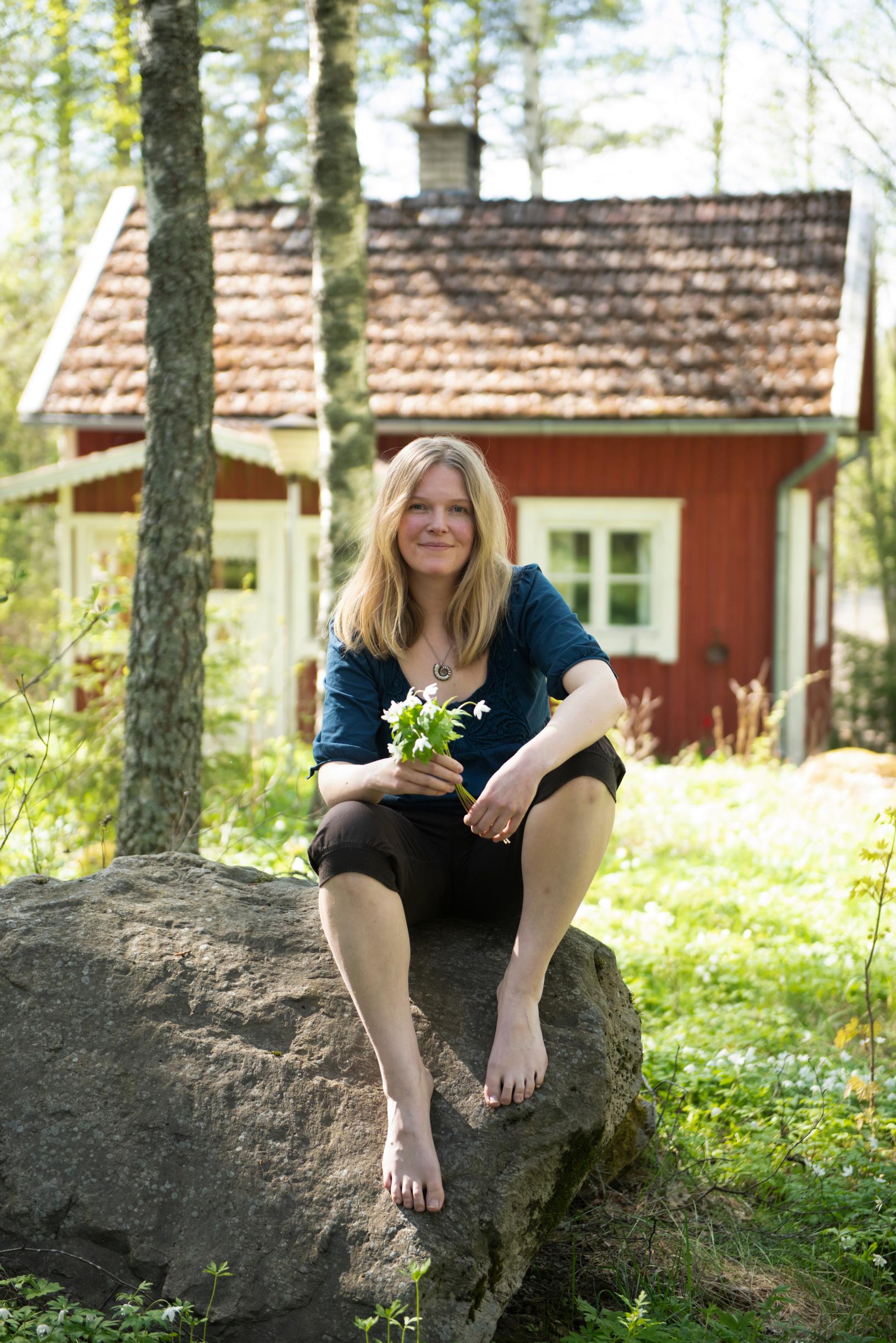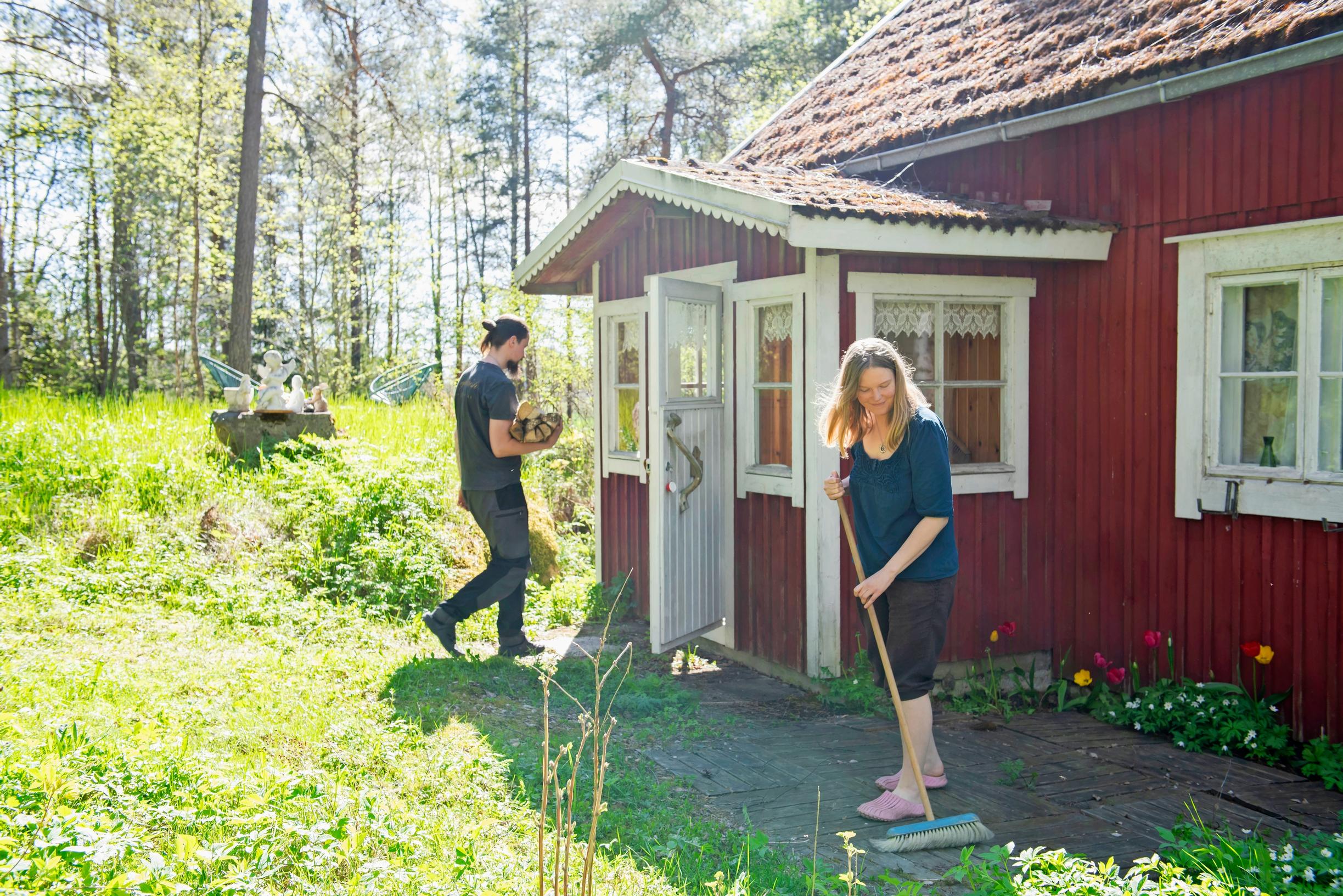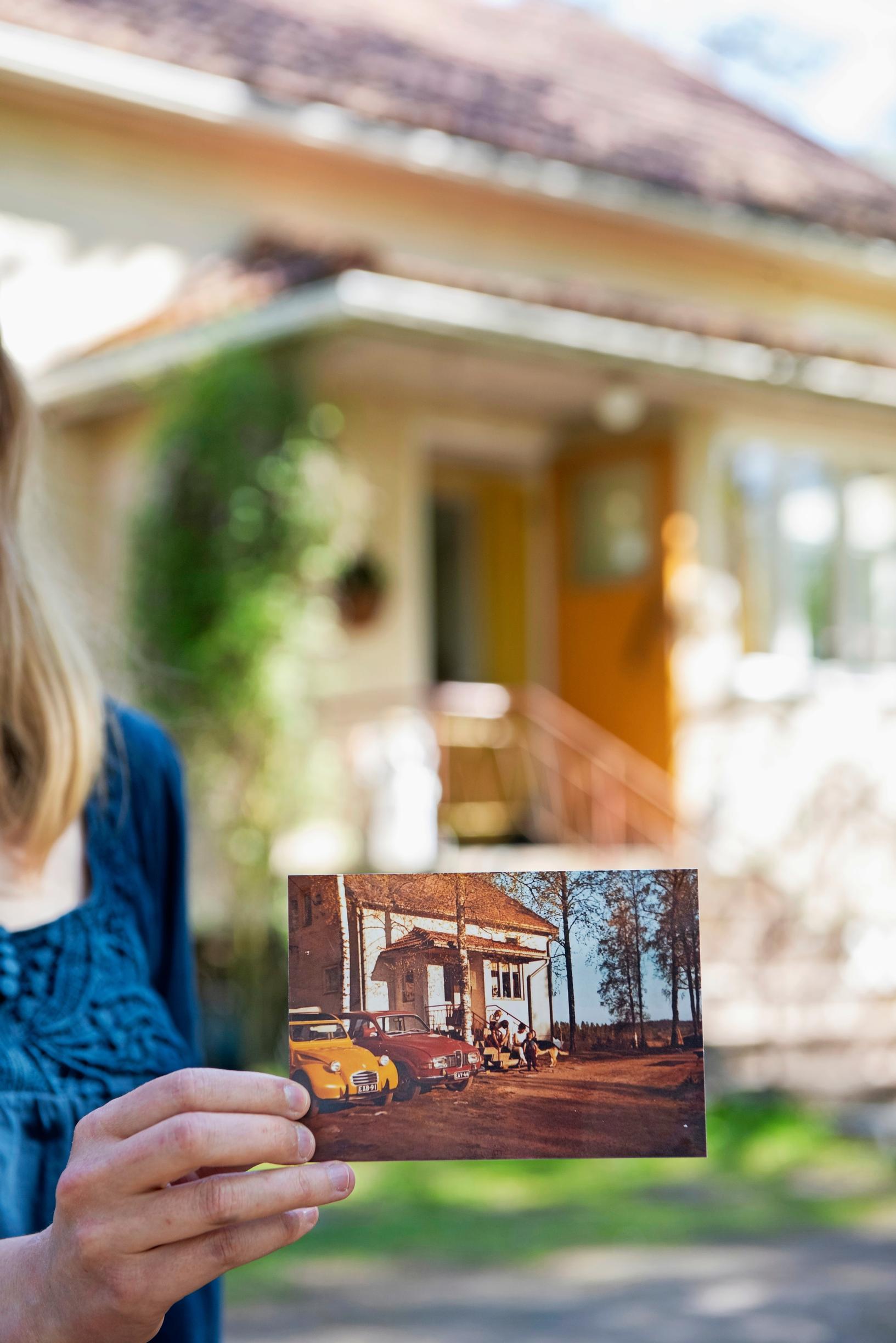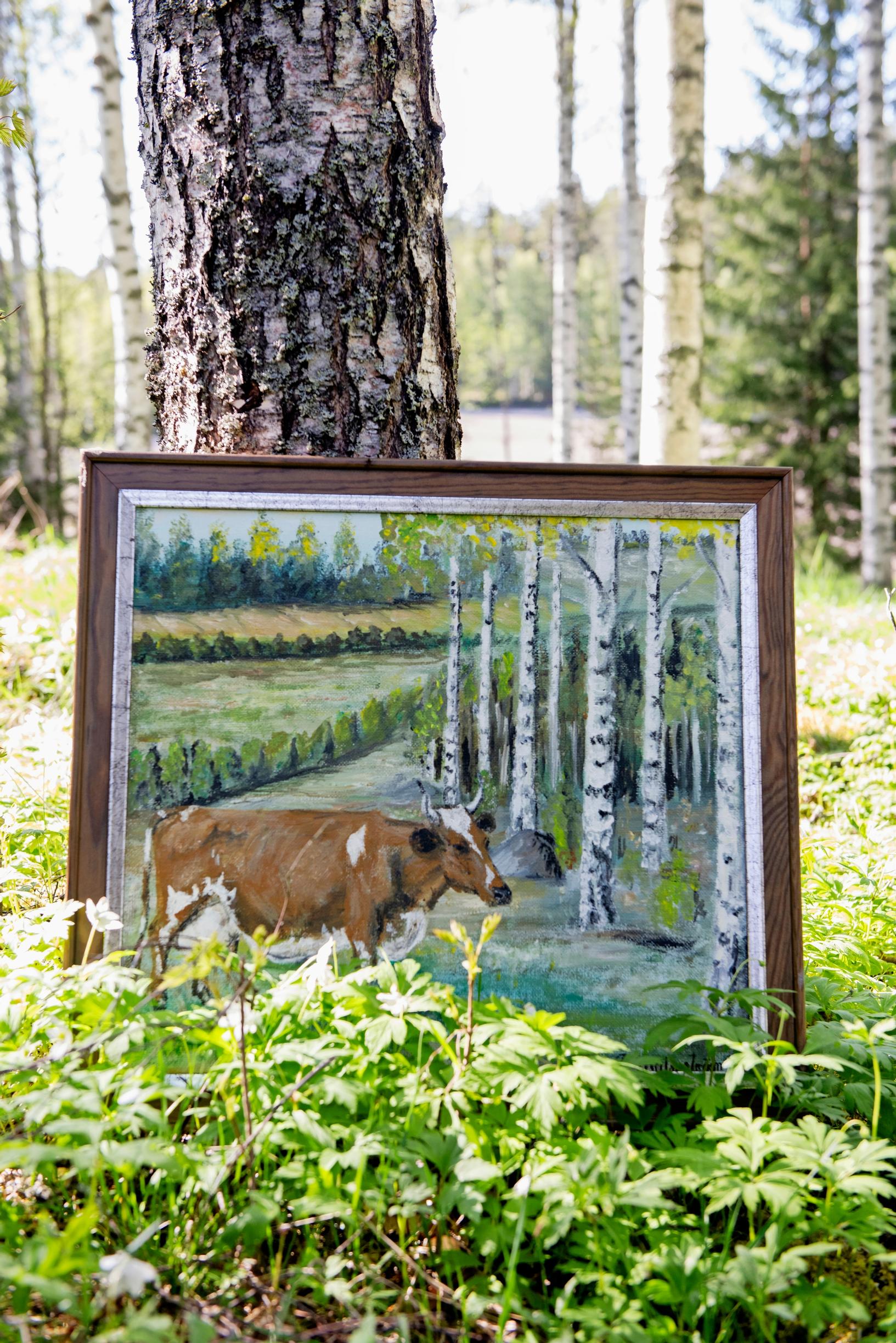
At 37, she moved into her grandparents’ house: “I can imagine myself all old and wobbly here. If I had to leave, I wouldn’t know where I’d go”
Jonna found both peace and her forever home in her old grandparents’ house. “I feel safe, loved, and proud of my home region.”


When Jonna Saari starts cooking on the wood-burning stove, she slips on an apron her mother sewed back in school. The kitchen looks the same as it did decades ago, when Jonna’s grandma and grandpa lived in the house.
There are two houses on the property: a small red log cabin from the 1940s and a light brown stone house from the 1950s built using the typical Finnish home design of the time. Jonna’s grandma and grandpa managed in the two-room cabin as long as they only had four children. The bigger house was finished when the fifth was born. Grandpa’s brother did the masonry, and the house became Jonna’s mother’s childhood home.
Nearly 20 years passed in Jonna’s life with no involvement in this place. When she returned, everything was just as it had been before.
“That’s the feeling I like, because it makes me feel safe.”
Jonna moved to her grandmother’s home in Salo, Finland, with her spouse Joel Saari just under three years ago. They had moved from Lapland down south a few months earlier, first into Grandma and Grandpa’s empty row house. They looked for a single-family home, but none felt right.
At that time, long-term tenants were living in the house. When they decided to leave, Jonna and Joel finally had the chance to move in. They agreed to it the same day Jonna’s aunt offered them the rental opportunity. Jonna’s aunt had bought the house when Grandma and Grandpa gave it up.
At first, Jonna didn’t dare believe the house could be her forever home. She assumed no one wanted to sell the property. But they closed the deal this spring.
Her mind didn’t settle right away after returning to her home region. Jonna had lived in Lapland for eight years at five different addresses. She loved each home but couldn’t see herself growing old in any of them.
“I was still caught up in the idea of moving frequently and figured maybe we’d only stay in Salo for a while. But once I settled in, I no longer wanted to leave. Here, I can imagine myself all old and wobbly. If I had to move out of this house, I wouldn’t know where to go.”


Home was a great honor
As a child, Jonna lived with her family about a 30-minute drive from her grandma and grandpa’s house. She was still young when her grandparents moved to a row house. Her memories are fragments: Grandma in the kitchen setting the table and offering berry juice, Grandpa tending the beehives. She remembers herself running from the sauna to the little pond along a path. Back then it was fit for swimming; now, all you hear are frogs croaking and splashing.
Jonna and Joel haven’t really renovated the house, and they don’t have big plans either.
“I’m lazy and thrifty,” Jonna says with a laugh.
The old kitchen works just fine and feels homey. The couple buys as much of their furniture secondhand as possible, rearranging it around the house like a game of Tetris.
They do, however, want to keep the house in good shape.
“It was an honor to get this place, and I want to take care of it. It feels wonderful that it ended up being ours.”


She found self-understanding up north
Jonna left for Lapland just over ten years ago. She had her first burnout while studying at a university of applied sciences. Life was social and draining, full of frustration, feelings of inadequacy, and a sense of not fitting in. She wondered why she felt so out of place, not yet realizing she was very introverted. Jonna was diagnosed with depression.
Moving to Lapland was a major turning point. It meant a lot to Jonna that she no longer had to force herself to be outgoing.
“That’s where I found peace and started to understand myself.”
Her second collapse came when she was working. In Lapland, Jonna had a remote media job, and between trying to be a straight-A performer and feeling like an impostor, she worked far too much.
There were many reasons to leave Lapland. The COVID era had already worried Jonna, with aging parents a thousand kilometersaway. She grew tired of all the snow, and Joel wanted different work than gold mining.
The final nudge was the war in Ukraine. Jonna lost sleep from reading too much news and feared Russia might attack Finland next. The couple lived in a remote area, 30 kilometers from the nearest store. Cabin fever set in. What if they ran out of fuel and ended up stranded?
Jonna admits she’s prone to catastrophic thinking, and at times it has impacted her life. Age has steadied her a bit, as has her very calm partner. Jonna met Joel a couple of months after moving to Lapland.
Moving back to a familiar place in her home region has brought her a great sense of security.
“Here, I’m among my own, and we have a safety net,” Jonna says.
Jonna loves the darkness of rural life. There’s no light pollution, so the Milky Way is visible. Wolves roam nearby, but she isn’t afraid; she feels proud to share the area with them.
“Lapland held a sense of adventure, and I experienced it. After a while, I wanted something permanent. Here, I feel at home. I learned the importance of having my own peace, and I guard it lovingly.”


Roots in the home region
Without her years in Lapland, Jonna likely wouldn’t have such a strong bond with her roots. She had to go far to see her home region with new eyes. Whenever she visited from Lapland, she started noticing things: the towering trees, the houses built long before the wars, and the exotic fortress hills.
In her home area, you can proudly say where you’re from, and often the listener knows the families and homes.
Even while living in Lapland, Jonna started asking her family about their roots. She realized knowledge disappears quickly. For instance, nobody knew which house her paternal grandfather was born in.
Now Jonna has tracked down relatives’ houses and explored the nearby areas. In her job, she investigates nature spot maps.
“I like to tie my thoughts to places. I want to understand what nature was like around my parents and grandparents.”
Jonna’s father grew up on an island called Saari, which is half a day’s walk through the woods from the family home. Recently, Jonna trekked from her mother’s childhood settings to her father’s childhood land, starting at the rocks where her mother once played and ending at the rocks where her father built his playhouse.
“That journey was spiritually significant for me in terms of my roots.”
These areas are also home to both of her grandfathers. They used to take grain by horse to the nearby mill to be ground. Jonna passes the mill’s ruins several times a week on her walks.
Jonna’s paternal grandfather Toivo allegedly knew how to navigate the forests well, and Jonna feels connected to him when she strolls through them. She experiences both stillness and continuity at the same time.
“People pass on, but places endure.”
Now she feels safety, love, and pride in her roots and home region.
“It feels extra special that my dad’s roots are also here, not just my mom’s. I feel whole here, which is probably why I’m so calm and peaceful.”
Free from mortgage burdens
Before, Jonna assumed that to get a house, she’d have to take out a huge loan. She didn’t want that. She’d rather pay less for housing and work less.
In Lapland, she managed to buy a house for 40,000 euros, opening her eyes. In the south, the couple set 80,000 euros as their max. The estimate for the grandmother’s house came in just under that.
“I don’t believe in fate, but if I did, I’d say everything lined up perfectly. And you can’t buy sentimental value with money.”
Now Jonna and Joel only have a seven-year home loan. Life also feels less stressful because Jonna is voluntarily childfree. She thinks it’s more an inherent trait than a choice—she’s never felt a need to have children.
In general, Jonna aims for as much freedom as possible in her life. She works remotely four days a week. Nature is her pastime: roaming the forest and underwater photography.
“If I don’t feel like doing anything in my free time, I don’t. I can just be. Not feeling guilty is my superpower. It allows me to really tune in to myself.”
Peace and the surrounding nature guarantee she can live life on her own terms.
“That’s extremely important for my happiness. I get to be who I am and live in a way that feels natural to me.”
Jonna’s tips for finding your roots
1. Talk to the oldest members of your family before it’s too late. Ask for the names of villages and houses where relatives were born. Look through old photos and maps together. Place names spark memories, so collect the stories.
2. If you know the name of the house, you can search for it on the Finnish National Land Survey’s map service. The map also shows rapids and cliffs, so if you visit, you can plan a nature trip around them.
3. If you live near your roots, try to see your home area through an outsider’s eyes. Go explore places you’ve never seen before.


